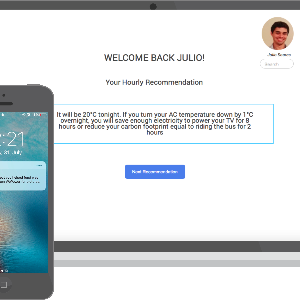Please find below the
Finalist Evaluation
Judges'' ratings
| • | Novelty: | |
| • | Feasibility: | |
| • | Impact: | |
| • | Presentation: |
Judges'' comments
Judge 1: As was indicated by one of the judges in the previous round, the core concept being proposed here isn't anything new, it is being attempted by multiple companies right now that have a number of different products in the market, all of which aim to drive behavioral change. The proposal adds a slightly different 'spin' to this by linking it to social projects. How much benefit this can actually have is anyone's guess, but learning from experiences with other approaches, there is a hard ceiling that will be reached pretty quickly. That said, I think that all efforts that can drive behavioral change should be highlighted, and despite the limited benefits, I think that the authors have put together a compelling and clear proposal that warrants advancing it to the next round.
Judge 2: The idea is not new but tackles an important aspect: people behaviour, which is proven potentially responsible for large energy savings. While there is literature available on the subject, implementation of effective measures is lacking. This project is interesting but the algorithm has not been developed yet and the degree of sophistication to become effective is expected to be high. There are already commercially available systems (e.g. Aktivehaus - Context-sensitive home automation system alphaEOS) that use the same principle to automatically regulate how the house works instead of rely on the willingness of the occupants to act. The effectiveness of the proposed solution should be demonstrated through a pilot project before investing in a larger initiative. It is not clear if partnership with utilities, companies and government agencies is an aspiration or initial contact and expression of interest have been initiated. The changing colour light bulb component required further explanation for both development and application.
Judge 3: A proposal that deals with already developed topic, but approaching it in an innovative way. In particular it seems very interesting the use of gamification and the development of the platform. Moreover, are appreciable the details of the timeline and the projected costs. The reviewed proposal is more clear then the previous one.
Judge 4: Analytics of this type abound; there are a few new perspectives here and the idea of the lightbulb signal is an interesting experiment - reminds me of the Ambient Devices "Energy Orb". In Portugal it might be novel. But no one has made an appealing system that captures imagination in the mass market so worth a try.
Semi-Finalist Evaluation
Judges'' ratings
| • | Novelty: | |
| • | Feasibility: | |
| • | Impact: | |
| • | Presentation: |
Judges'' comments
Comments from Judge 1:
Many groups around the world are working to develop similar concepts. This one's use of a colour changing lamp to provide feedback, and gamification including building credits to donate to worthy causes increase its likelihood of success. The project seems to have links to potential project partners. The algorithms on which the product will be based have not been developed, and very little information on their overall operation is provided. So it is difficult to judge likelihood of success. The estimate of funding needed to develop the software seems low for a sophisticated system. The estimate of 30% saving from use of the tool seems high, and is not justified in the proposal.
Comments from Judge 2:
This is a useful idea and there is a lot of literature on the effectiveness of such platforms. In order to make impact, it would be important for the authors to do surveys and understand the needs of the end consumer. Would they use this platform? How can it be make specific to their context? Also, buy in from the government and utilities should be demonstrated.
 Ioana Dragos Nov 6, 2017 04:26 | Proposal creator Thank you for the feedback! I included it in the description of the project. To also guide you through the changes in the application: 1. The novelty of We-power compared to other similar concepts is the 'Save to Donate' feature. There is an obvious lack of concern for energy efficiency on a tenant level but also a lack of incentives ( energy is not a big cost for people to worry about, especially middle- and high-income households and offices). What We-power sets out to do is not only develop the algorithm but use the platform to drive behavioral change. After reading papers on the analysis of psychological factors fostering the adoption of energy saving measures in cities and other papers on behavioral change, we came to the conclusion that financial aspects are not an incentive and other solutions must be found, such as a feeling of well-being and social approval. After conducting an online survey it resulted that most people would be willing to save energy if they knew the money would go to social projects. 2. Although the work on the algorithm has not started, the two energy engineers and experts gave a short description of the algorithm within the application, which hopefully will make it clearer on the development of the algorithm. 3. We revied and adapted the breakdown of costs and came up with a more realistic estimation of the initial costs. 4. The 30% savings is an estimation that we took from the competitors' analysis in the initial stages of developing the idea. Of course, it will vary for each end-user! We calculated the climate impact and financials with an estimation of 10% energy savings to be more conservative, and included the numbers for the climate impact in the proposal. 5. The next step in our timeline is to extend the research on customer and end-user needs. I included the survey we ran on the Save to Donate feature.
|
